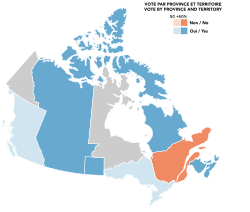Canadian prohibition plebiscite, 1898
| Canadian prohibition plebiscite, 1898 | ||||||||||
|---|---|---|---|---|---|---|---|---|---|---|
| Date | September 29, 1898 | |||||||||
| ||||||||||
| ||||||||||
 |
| This article is part of a series on the politics and government of Canada |
| Government |
|
|
Related topics |
A plebiscite on prohibition was held in Canada on 29 September 1898, the first national referendum in the country's history.[1] The non-binding plebiscite saw 51.3% in favour of introducing prohibition, although turnout was only 44%. A majority voted for its introduction in all provinces except Quebec, where 81.2% opposed it.
Despite the majority in favour, Prime Minister Wilfrid Laurier's government chose not to introduce a federal bill on prohibition. As a result, Canadian prohibition was instead enacted through laws passed by the provinces during the first twenty years of the 20th century.
Results
| Jurisdiction | For Prohibition | Against Prohibition | ||
|---|---|---|---|---|
| Votes | % | Votes | % | |
| Northwest Territories | 6,238 | 68.8 | 2,824 | 31.2 |
| British Columbia | 5,731 | 54.6 | 4,756 | 45.4 |
| Manitoba | 12,419 | 80.6 | 2,978 | 19.4 |
| New Brunswick | 26,919 | 72.2 | 9,575 | 27.7 |
| Nova Scotia | 34,368 | 87.2 | 5,370 | 12.8 |
| Ontario | 154,498 | 57.3 | 115,284 | 42.7 |
| Prince Edward Island | 9,461 | 89.2 | 1,146 | 10.8 |
| Quebec | 28,436 | 18.8 | 122,760 | 81.2 |
| Canada | 278,380 | 51.2 | 264,693 | 48.8 |
See also
References
- ↑ Referendum The Canadian Encyclopedia
Further reading
- Dostie, Benoit; Dupré, Ruth (2012). "'The people's will': Canadians and the 1898 referendum on alcohol prohibition". Explorations in Economic History. 49 (4): 498–515. doi:10.1016/j.eeh.2012.06.005.
- Smart, Reginald G.; Ogborne, Alan C. (1996). Northern Spirits : A Social History of Alcohol in Canada (2nd ed.). Ontario: Addiction Research Foundation. ISBN 0-88868-276-X.
- Samuel E. St. O Chapleau (1898). "Report on the prohibition plebiscite held on the 29th day of September 1898 in the Dominion of Canada". ISBN B0008D4FCS
This article is issued from Wikipedia - version of the 6/23/2016. The text is available under the Creative Commons Attribution/Share Alike but additional terms may apply for the media files.

